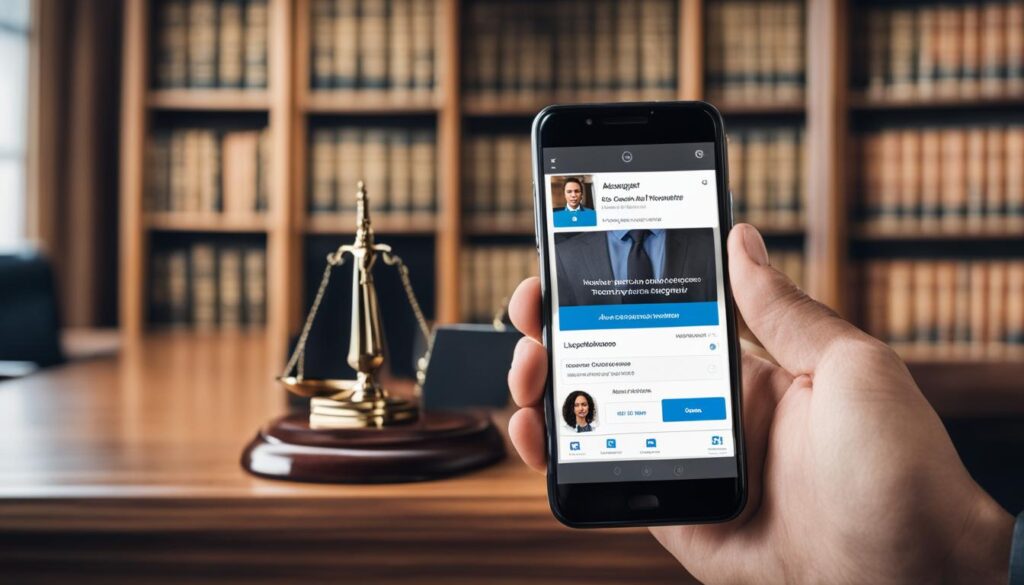Did you know 93% of attorneys think it’s vital to have a good online image for their law firm’s success? Social media is now a key part of our lives. Lawyers use it to reach potential clients and boost their image.
Social media lets lawyers show their skills, talk to their audience, and become trusted leaders in their field. By using smart reputation management tactics on social media, lawyers can gain trust, credibility, and attract more clients.

Key Takeaways:
- Social media platforms are essential for lawyers to build and manage their online reputation.
- Effective content creation and engagement with potential clients can establish lawyers as trusted thought leaders.
- Identifying the target audience and selecting suitable social media platforms are crucial for success.
- Thought leadership, humanizing the brand, and responding promptly to comments can enhance reputation.
- Optimizing bios, sharing informative content, and hosting live Q&A sessions are effective reputation management strategies.
Identifying Potential Clients and Competitor Analysis
Lawyers need to know who their potential clients are and understand their needs. They should do a competitor analysis to find gaps in services. This will help them make social media content that meets client needs. It also helps them be different from others.
It’s key to know which social media platforms reach potential clients best. Every platform has its own type of users, making the choice important. For instance, LinkedIn is better for corporate law because it’s professional. But, Facebook and Instagram are good for family law due to their personal touch.
Conducting Competitor Analysis
Competitor analysis helps lawyers see their competitors’ strengths and weaknesses. They look at their competitors’ social media, content strategies, and how they engage with people. This helps lawyers find ways to be better and unique.
“Identifying potential clients and analyzing what competitors do is essential for lawyers to do well in social media marketing.”
With insights from competitor analysis, lawyers can make content that captures their audience’s interest. They can tackle common issues, share educational stuff, or give unique legal viewpoints. Knowing their unique traits helps lawyers demonstrate their expertise. This builds trust with potential clients.
Social Media Platforms for Lawyers
| Social Media Platform | Target Audience | Features and Benefits |
|---|---|---|
| Professionals, corporate clients | Professional networking, thought leadership, business development opportunities | |
| General public, potential clients | Broad reach, visual content sharing, community engagement | |
| Younger demographic, visually-oriented clients | Visual storytelling, brand building | |
| General public, news outlets, influencers | Real-time updates, engagement with thought leaders |
By studying potential clients and competitors, lawyers can plan their social media marketing well. This way, they won’t just stand out but also be seen as trusted experts. This strategy is key for success in connecting with their audience.
Creating Quality Content
Creating high-quality content is key to engaging potential clients on social media. It’s vital to know your target clients’ needs and what your competitors lack. By filling these gaps with informative content, you become a trusted info source.
Understanding Your Target Clients
Before making content, deeply understand your target clients. Research their interests, problems, and the info they seek. This makes your content relevant and valuable to them.
Social media analytics tools are great for understanding your audience. They show demographics, interests, and how people engage with your content. This helps you make content that fits their needs.
Identifying Content Gaps
To stand out, find content gaps in your industry. Analyze your competitors’ content. Look for topics they’re missing.
Addressing these gaps lets you offer unique insights. This sets you apart and shows you’re an expert.
Providing Valuable Information
When making social media content, focus on giving your audience useful information. Use blog posts, videos, and updates for this.
Blog posts offer a chance for deep dives into legal topics. They should be friendly and engaging. And use keywords well to help with SEO.
Videos are great for engaging and explaining things in a fun way. Think about making videos that simplify legal ideas or answer common questions.
Keep your social media fresh with articles, news, or tips. This keeps people interested and views you as a legal info source.

Creating quality content is a must for attracting clients on social media. Know your audience’s needs, find what’s missing, and provide great info. This builds your reputation as a reliable information source.
Establishing Thought Leadership
Establishing thought leadership is key for lawyers aiming to build trust on social media. They can showcase their expertise by posting informative content. This approach not only promotes them but also adds value for the audience.
Lawyers need to share content that solves their audience’s problems. Posting expert insights and advice shows their deep knowledge. They can use blogs, videos, or infographics for this.
Showing off their know-how with educational posts is a smart move. Lawyers should educate and help their followers. This could be by updating on laws, simplifying tough legal ideas, or offering useful tips.
It’s crucial to mix valuable info with some promotion of the law firm. The recommended ratio is 80% helpful content to 20% firm promotion. This balance keeps the content worthy and not just an ad.
Regularly posting meaningful content on social media is beneficial. It helps lawyers connect with their audience, boosts their status as trusted experts, and grows their business.

Keys to Establish Thought Leadership:
- Create informative and insightful content that addresses the needs of the target audience.
- Share expert insights, practical advice, and tips to showcase expertise.
- Strive for a balance between valuable information and self-promotion.
- Consistently deliver thought-provoking and engaging content on social media.
By following these steps and sharing great content, lawyers can become thought leaders. This wins the trust of potential clients and cements their place as industry experts online.
Humanizing Your Brand Story
Building trust on social media takes more than showing off your services and expertise. To connect with potential clients, your brand needs to feel real and approachable. Share your law firm’s story and the people behind it to create a personal touch for your audience.
Personal stories are a powerful way to bring your brand to life. Talk about how your law firm started, the obstacles you’ve faced, and what drives your team. These stories build trust by showing you’re more than just a business. For instance, tell the tale of how the founders imagined the firm’s future.
Showing what goes on behind the scenes also helps. Let your audience peek into your law firm’s day-to-day activities. This could be through photos or videos of team gatherings, celebrations, or helping in the community. It makes your firm seem more human, building trust and closeness.
Talking about your firm’s values and goals is key too. Make it clear what your firm stands for and your work ethic. Share stories about your pro bono efforts, community work, or nonprofit partnerships. This shows you care about more than just business, attracting clients who share your values.

By making your brand relatable, you form a bond with your audience. This bond makes them more likely to trust and choose your law firm for their legal needs.
To wrap up, telling a compelling brand story and making your law firm seem more human on social media are crucial. Share personal stories, give a behind-the-scenes look, and emphasize your values and mission. This approach helps you connect emotionally with your audience and stand out from rivals.
Monitoring Conversations and Reviews
It’s crucial to monitor conversations about your law firm on social media. This helps in managing your online reputation. By using social listening tools, you can understand what people say about your firm. You’ll also be ready for any negative feedback or PR issues.
Social listening tools help you track your law firm’s mentions and keywords online. You can see what’s being said across social media. This lets you spot trends, see how people feel about your firm, and make informed choices.
“Social listening tools provide valuable insights into what people are saying about your law firm, helping you address any issues and proactively manage your online reputation.”
Reviews from clients are really important on social media. They can make your firm look good and win over new clients. Getting happy clients to leave client reviews boosts your firm’s image and helps people see you online.
To keep an eye on conversations online, follow these steps:
- Use social listening tools to find your law firm’s mentions and keywords on social media.
- Look at what people are talking about. Identify trends, understand their feelings, and address negative comments.
- Always answer reviews quickly and with professionalism. Show you care about client satisfaction and your expert knowledge.
- Ask happy clients to leave client reviews online. This shows you’re credible and draws in new clients.
Monitoring your law firm on social media helps manage your reputation. It addresses any issues and builds trust with possible clients. Use the right tools and strategies to keep up-to-date and proactive online.

Utilizing Informative Videos
Videos are great for lawyers wanting to teach about law and share the latest trends. They can put up these videos on social media to show their skills and draw in clients. Through videos, lawyers can explain hard law topics easily or share new legal info in a lively way.
For these videos to work, they must be real, right, and useful. Lawyers need to share well-looked-into info in a simple way. They should talk about big law ideas and trends that matter to their audience. This makes them go-to sources of legal knowledge.
Lawyers can make videos answering common questions or clearing up wrong ideas in law. This shows their know-how and helps people understand important legal stuff. Providing useful videos on topics that matter to their audience, lawyers become valuable aids and build trust.
Videos also let lawyers share their personality and connect better with people. By mixing their legal knowledge with their personal views and experiences, they can make interesting videos. These videos grab potential clients’ attention.
When posting videos on social media, lawyers should pick smart titles, descriptions, and tags. Using the right keywords, like “legal concepts” and “current legal trends,” makes their videos more likely to be found in searches. This boosts their online presence.
Adding transcripts and captions to videos is another smart move. Transcripts help search engines find the videos, making them easier for people to discover. Captions make videos better for those who can’t hear well or prefer reading. This makes the content more accessible.
Benefits of Utilizing Informative Videos:
- Establishing expertise in legal concepts and trends
- Building trust and credibility with potential clients
- Engaging the audience through dynamic and visual content
- Creating a personal connection with the audience
- Increasing online visibility and reach through optimized titles and descriptions
- Enhancing accessibility and user experience with transcripts and captions
Here’s how using videos affects law firms on social media compared to just writing:
| Videos | Written Content | |
|---|---|---|
| Average View Duration | 2 minutes and 30 seconds | 45 seconds |
| Engagement Rate | 12% | 3% |
| Shares | 500 | 150 |
As the table shows, videos really help law firms on social media. They get more people watching longer, engaging more, and sharing content. This proves videos are great for explaining tough law ideas and getting people interested.

Sharing Regular Blog Posts and News Updates
Regular blog posts and news updates help lawyers boost their online image. They let lawyers connect with people and show they are credible in the law field. Sharing quality content on social media sets them apart from the competition.
By posting often, lawyers can display their knowledge. They give useful info to people who need it, positioning themselves as go-to experts. Blogging lets them tackle various legal topics, making complex ideas easier to understand and offering advice for legal challenges.
It’s just as crucial to share the latest legal news. Lawyers show they’re up to date with law changes affecting their areas. Sharing these updates makes them look like experts and attracts clients looking for current legal info.
Content must match what the audience needs. It should be correct, clear, and helpful. Giving helpful insights and tips builds trust with the audience.
Regular updates also open the door for social interaction. When lawyers post on social media, they start conversations. They can build a community by replying to comments and questions. This shows they care and are ready to help with concerns.
By being active on social media, lawyers manage their reputation better. They become more visible and draw in clients who value their expertise and services.

Optimizing the LinkedIn ‘Skill and Endorsement’ Section
Lawyers need to focus on their LinkedIn profile for branding. LinkedIn showcases their skills, knowledge, and trustworthiness. The ‘Skill and Endorsement’ section is crucial.
This section lets lawyers show their abilities and get endorsements. By fine-tuning this area, lawyers make their profile more appealing. This attracts possible clients.
Here are tips for the ‘Skill and Endorsement’ section:
- Showcase your expertise: Pick skills that relate to your expertise. Be clear and select abilities that show your unique lawyer traits. For instance, if your focus is corporate law, add ‘Mergers and Acquisitions’ or ‘Corporate Governance’. This helps clients understand what you do and boosts your profile’s visibility online.
- Receive endorsements: Get endorsements from those who know your work. This shows your skill level and builds your profile’s credibility. Ask pleased clients and fellow workers to endorse you. Then, do the same for them. This shows your worth in your field.
- Avoid exaggeration: Make sure to be truthful about your skills. Overstating your abilities can harm your reputation. Only include skills that are genuine and endorsed. Real endorsements are valuable for marketing yourself online.
Optimizing the ‘Skill and Endorsement’ section helps lawyers stand out. It boosts their branding and draws clients looking for their legal services.
“The ‘Skill and Endorsement’ section is key to law firm branding. It shows a lawyer’s expertise and brings in endorsements, which raises their profile among potential clients.”
Next, we’ll look at how important it is to talk and reply quickly on social media. This builds connections and a good reputation.
Engaging in Conversations and Responding Promptly
Social media helps lawyers connect with their audience. It’s important to chat, reply to comments, and start talks. This builds trust and shows you care about your clients.
Asking intriguing questions can engage people. It shows you’re interested in their views and want to help. You become a go-to expert this way.
Replying quickly on social media is also key. It shows you listen and are ready to help. Quick replies keep your online presence strong and active.
Remember, building connections is not just about promoting your services—it’s about establishing relationships and fostering trust. By actively engaging with your audience, you can build long-lasting connections that go beyond simple transactions.
Always be supportive and respectful online. Deal with negative feedback calmly and professionally. This turns challenges into chances to impress and connect.
Building Connections Through Personalized Messages
Sending personalized messages helps connect deeply. It shows you’re focused on their specific needs.
In these messages, listen and give advice that fits their situation. Your expertise and care can make them choose you.
Case Study: How Responding to Comments Can Strengthen the Lawyer-Client Relationship
| Law Firm | Client Comments | Law Firm Response |
|---|---|---|
| Smith & Associates | “I had a great experience working with Smith & Associates. They were attentive to my needs and provided excellent legal advice.” | Thank you for your kind words! We’re glad that we were able to assist you. |
| Lawyers4You | “Disappointed with the lack of communication from Lawyers4You. They took forever to respond to my messages.” | We apologize for any inconvenience caused. We strive to improve our response time and appreciate your feedback. |
Smith & Associates shows their care by thanking a happy client. Their response boosts their positive image.
Lawyers4You admits their fault to an unhappy client. Addressing criticism well can lessen its bad effect on your image.

Talking and replying quickly on social media are crucial for lawyers. It shows your willingness to engage and share insights. This builds trust and draws clients.
Hosting Live Q&A Sessions
One effective way for lawyers to talk to their audience is through live Q&A sessions. These sessions let lawyers answer audience questions directly. This helps build trust and personal bonds.
Platforms like LinkedIn, Instagram, and Facebook have live video features. Lawyers can use these for their Q&A sessions. By answering questions live, lawyers show their knowledge and give valuable insights.
During these sessions, lawyers can talk about various legal topics. They can also offer practical advice. This helps potential clients understand the lawyer’s skills, boosting their confidence in them.
Live Q&A sessions help lawyers address specific questions. They can also showcase their communication skills and ability to answer clearly.
By engaging live, lawyers make a personal connection with their audience. It makes them seem more human and open to meaningful discussions.
Live Q&A sessions let lawyers tackle common concerns and clear up legal confusion. They help potential clients make informed decisions. Lawyers also come across as trusted advisors.
To promote these sessions, lawyers should ask their audience for questions beforehand or during the event. This keeps the session engaging and makes everyone feel included.
Hosting live Q&A sessions helps lawyers make strong online connections and interact personally with their audience. It’s a great way to demonstrate expertise, build trust, and start valuable relationships.
Benefits of Hosting Live Q&A Sessions:
- Provides a personal and interactive experience for the audience
- Allows lawyers to showcase their expertise in real-time
- Builds trust and establishes credibility
- Addresses specific questions and concerns
- Debunks myths and clarifies complex legal matters
- Creates a personal connection and humanizes the lawyer’s online presence
Live Q&A sessions are a smart move for lawyers to connect, answer questions, and build trust. It brings personal interaction to the forefront, making lawyers trusted advisors and leaders in their field.
| Platform | Features |
|---|---|
| – Offers live video options for Q&A sessions – Provides a professional platform for engagement |
|
| – Live video feature allows for Q&A sessions – Wide reach among a younger audience |
|
| – Live video option for hosting Q&A sessions – Large user base and potential reach |

Optimizing Bios and Using Trustworthy Links
Optimizing bios on social media is crucial for lawyers. A good bio shares the lawyer’s story, practice area, and who they are. It helps build trust by showing the lawyer’s personality.
Lawyers should also share links to useful articles and resources. Trustworthy links show they value learning and sharing knowledge. This makes their online presence more credible.
Having a good bio and sharing reliable links can really help lawyers stand out online. It makes them seem authentic, smart, and helpful. This way, they can attract more clients and build a strong name in the legal field.